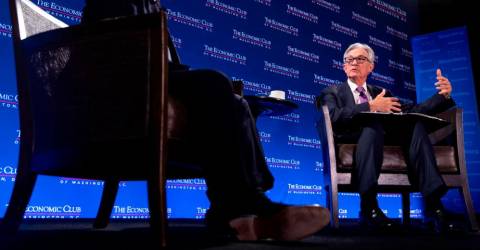WASHINGTON: Friday’s blockbuster US jobs report showed why the battle against inflation will “take quite a bit of time” Federal Reserve (Fed) chair Jerome Powell said on Tuesday (Feb 7), acknowledging that interest rates may need to move higher than expected if that sort of economic strength threatens the Fed’s progress in lowering inflation.
In a question-and-answer session before the Economic Club of Washington, Powell declined several times to say explicitly that the surprising addition of 517,000 new jobs in January would necessarily force the Fed’s benchmark interest rate higher than the 5% to 5.25% range currently anticipated, a level implying quarter-percentage-point increases at the Fed’s next two meetings then a pause.
But it was another data surprise in an era that has been full of them, and the Fed chief said policymakers were open to shocks in either direction – ready to approve even tighter monetary policy if continued strong job gains lead to higher wages and prices, but also open to the idea that inflation may continue to cool despite ongoing job gains.
“We didn’t expect it to be this strong,” Powell said, but it “shows why we think this will be a process that takes quite a bit of time”.
Based on history the current 3.4% unemployment rate, a 53-year-low, may be beyond “maximum employment” and likely would need to rise for inflation to return to the Fed’s 2% target, Powell said.
But with its roots in an unprecedented health crisis, “this cycle is different from other cycles … it has just confounded all sorts of attempts to predict”, Powell said, noting that wage growth has slowed even with continued strong job gains.
“It is good that we have seen a very strong labour market … at the same time, we’re seeing wages moderating … Inflation is starting to come down,” Powell said. “But it will do what it will do. Our job is to get inflation down to 2%,“ a process that he said was still just getting started and would likely take until at least into next year.
In the meantime interest rates will continue to rise, though how high remains unclear, with Powell’s remarks moving little beyond the comments he made after last week’s Fed policy meeting. Officials raised the target interest rate by a quarter of a percentage point to a range between 4.5% and 4.75% at that session, and said in the latest policy statement that “ongoing increases” would be needed.
Despite the strong jobs report, Powell repeated that he felt a process of “disinflation” was underway in the United States, with the Fed now watching how quickly it spreads to service industries where inflation has proved less quick to slow.
His latest remarks were “pretty similar” to the tone set after last week’s Fed meeting, wrote JPMorgan economist Michael Feroli. “This was a message of data dependency … he’s emphasising what conditions require more or less restraint” as the Fed watches how the economy responds to the rate increases approved so far, and particularly whether inflation continues what has been a consistent decline since the middle of last year.
Powell was not the first to express surprise at January’s job statistics, with some of his colleagues also nodding to the possible need for higher interest rates.
“I think it surprised all of us,” Minneapolis Fed president Neel Kashkari said in an interview broadcast on CNBC earlier on Tuesday, referring to the blowout jobs report last Friday.
Kashkari, who has been more aggressive than almost all his colleagues in his assessment of how high interest rates need to go, had said a month ago that he forecast the central bank’s policy rate should rise to 5.4%. The jobs report consolidated that view. – Reuters
